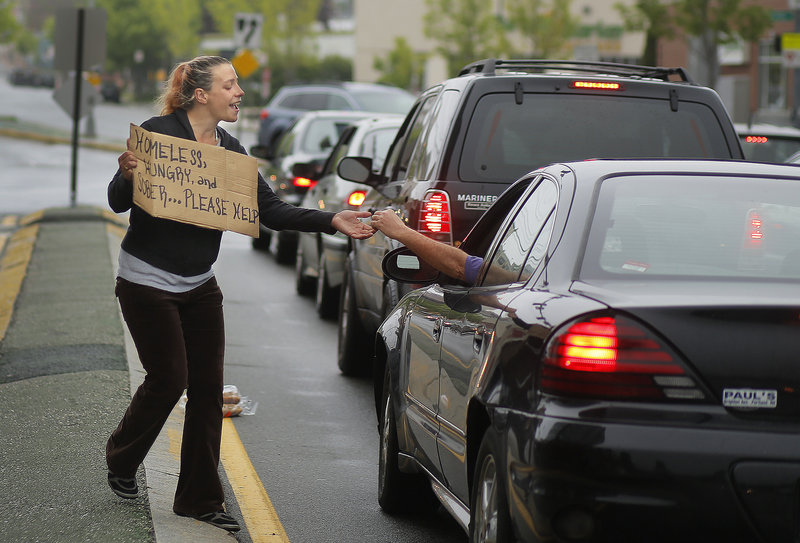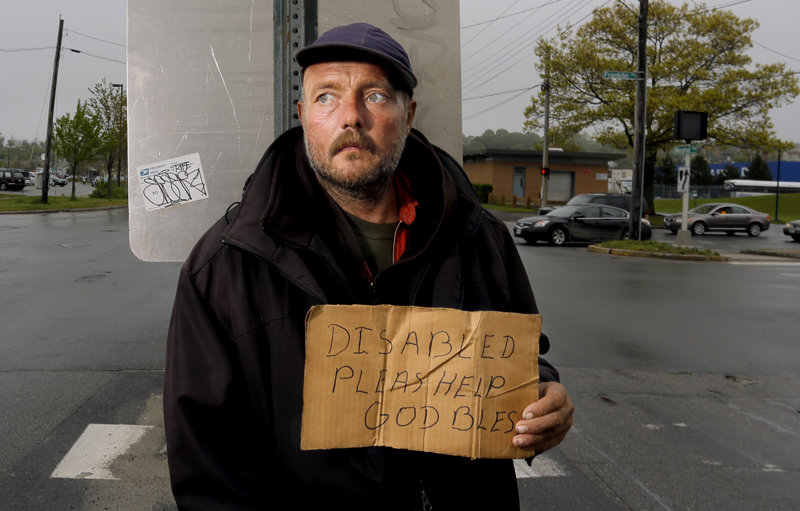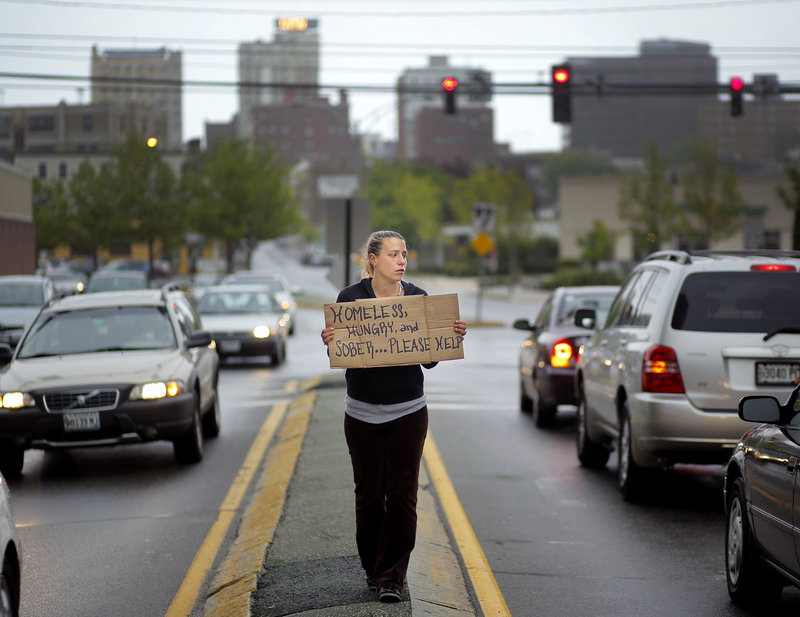PORTLAND – Parallel efforts are under way to tackle the growing issue of panhandling in the city, especially at busy intersections.
One effort involves resurrecting a previously failed effort to ban loitering on street medians, while the other is an education campaign about alternative ways to give responsibly to those in need.
Last fall, the City Council voted down a ban on loitering on street medians. Since then, many have observed a proliferation of people asking for money at busy intersections, creating what officials say is an unsafe situation for pedestrians and motorists alike.
“Whether it’s someone panhandling or waving a campaign sign, (the median) is an unsafe place to loiter,” said City Councilor Ed Suslovic, who leads the Public Safety, Health and Human Services Committee.
Panhandling is no longer an issue solely on the peninsula. In addition to the usual hot spots in Deering Oaks and along Marginal Way, begging in the median is now common on Forest Avenue – from the University of Southern Maine to Morrill’s Corner – West Commercial Street and Brighton Avenue.
The council’s public safety committee will take up the issue next month.
The Police Department, meanwhile, is working on a report about emergency calls stemming from unsafe activities in medians, said Police Chief Michael Sauschuck.
Panhandling also was the dominant theme of a meeting recently between neighborhood leaders and two of the city’s at-large councilors, Jill Duson and Nicholas Mavodones.
Duson did not return calls for comment Thursday and Friday. But Mavodones said residents have observed what appears to be organized collections at some of the busiest intersections, with people taking shifts standing in the median.
Meanwhile, some people in the medians are unsteady on their feet, while others walk in the travel lanes to approach vehicles. Occasionally, cars that have a green traffic signal suddenly stop in the middle of the road to give money to people, nearly causing accidents, residents reported.
“Now, every median that can be occupied is occupied,” said Emma Holder, president of the Parkside Neighborhood Association.
Stationed on one such strip Friday was Alison Prior, 29. Prior said she has been homeless since January and sandwiches in a few hours on the median at Preble Street and Marginal Way between appointments during the day. On a good day, motorists give $20 or $25.
Mostly, though, she depends on the donations to buy staples of modern life that working people take for granted.
“A stick of deodorant — that’s four people who are nice enough to give me a dollar,” said Prior, who sings to pass the time.
Within a few minutes, a woman heaved a fresh pack of hamburger buns from her car window. A few minutes later, someone gave a bottle of water. Prior said the proposed ban on loitering in medians would greatly reduce what little cash people like her can scrape together.
“I feel like people still look down on me,” she said. “I have a college education. I just had a bad run of luck.”
Although no city committee has discussed the prospect of another ban, the American Civil Liberties Union of Maine says it’s ready to take legal action, should the ban be approved.
ACLU of Maine’s legal director, Zachary Heiden, said in a blog post Thursday that the ACLU of Massachusetts has filed a lawsuit against the city of Worcester over a similar ordinance focused on panhandling in highway medians.
“We will be prepared to do the same here in Maine if necessary,” he wrote.
David M. Moore, Worcester’s city solicitor, said the city passed two ordinances earlier this year, both of which are the subject of the ACLU lawsuit. One bans aggressive panhandling, while the other is more a “super-jaywalking” ordinance.
The super-jaywalking ordinance respects people’s First Amendment rights to panhandle, Moore said.
“We’re not trying to focus on the content of anyone’s panhandling expressions,” Moore said. “We just say: It is not safe to be in the same piece of pavement as the cars going by.”
Portland Mayor Michael Brennan said the city’s proposed ban is similar in that it is a public safety issue and nothing else.
The proposal would not limit panhandling elsewhere in the city, such as on sidewalks.
“This has nothing to do with panhandling. It has everything to do with safety,” Brennan said.
Last time, the proposal was drafted at the request of the Police Department and unanimously endorsed by the council’s public safety committee.
But it was voted down by the full council in a 6-3 vote, after spirited opposition from homeless advocates and the ACLU of Maine. Brennan, Suslovic and Councilor John Coyne voted in support.
Mark Swann, executive director of the Preble Street Resource Center, which opposed the previous effort, declined to comment on the proposed ban until he learned more about it.
As public sentiment changes, councilors may follow suit.
“I can’t speak for other councilors but I have definitely softened my position,” Mavodones said.
City Councilor David Marshall voted last year for the ban at the committee level but opposed it when it came to the council. Marshall said he is hearing from a wider range of people concerned about the activity.
“I think it’s an important issue for us to discuss,” Marshall said. “I was divided on the issue before and I continue to be divided about it now.”
Perched on another median at Marginal Way and Franklin Street, Don Dietz, 48, leaned against a road sign, his cardboard placard pleading for help.
He said if the city passes the median ordinance, people with nowhere else to turn may resort to petty crime to get by.
“None of us like it,” Dietz said. “None of us want to stand out here. But it’s our only way of income right now.”
As the city tries to address the safety of its intersections, business leaders are forming a coalition to educate people about the best way to help those in need, said Chris O’Neil, the Portland Community Chamber’s liaison to City Hall.
“By making it easier to give money to bona fide programs, we can decrease the demand for direct panhandling,” O’Neil said.
O’Neil said there are several strategies under consideration, including a multimedia campaign.
Downtown business owners may somehow facilitate the collection of donations for service providers.
Also, the city may be willing to donate a dozen parking meters to be painted and placed around town to raise awareness of responsible giving, O’Neil said.
Jan Beitzer, executive director of the Portland Downtown District, said it was too soon to say what the effort would look like. But she pointed to the
“Have a Heart, Give Smart” campaigns in other cities as being a successful model.
O’Neil said he would like to see the education campaign be finalized and under way early this summer.
— Staff Writer Matt Byrne contributed to this report.
Randy Billings can be contacted at 791-6346 or at:
rbillings@mainetoday.com
Twitter: @randybillings
Send questions/comments to the editors.





